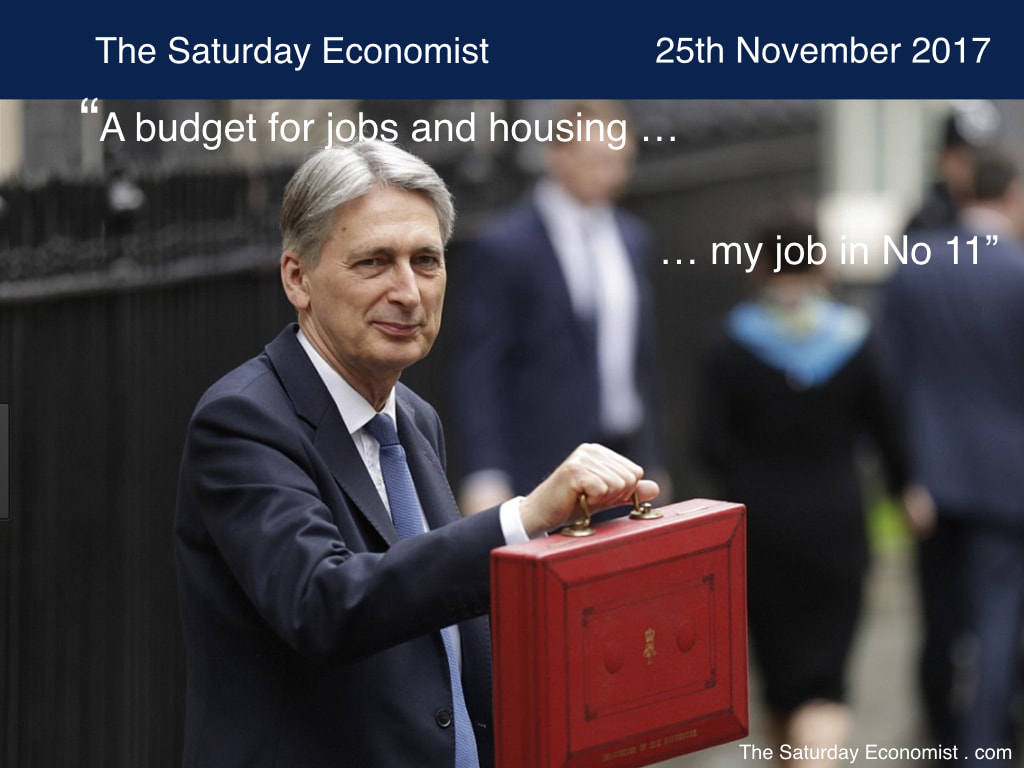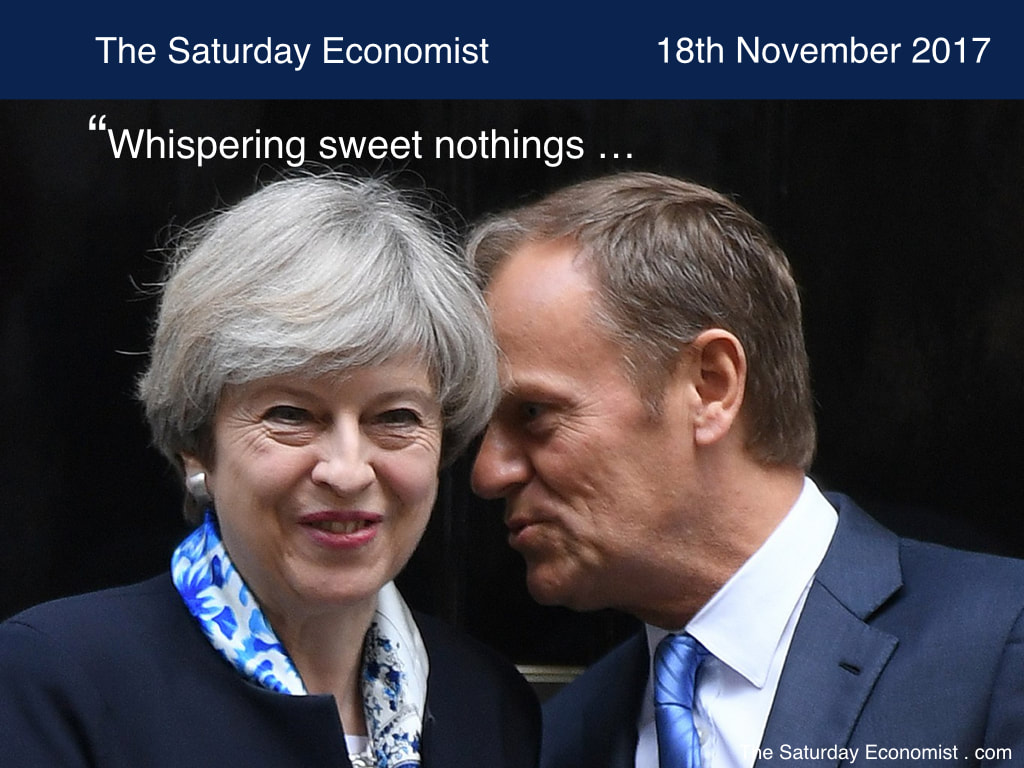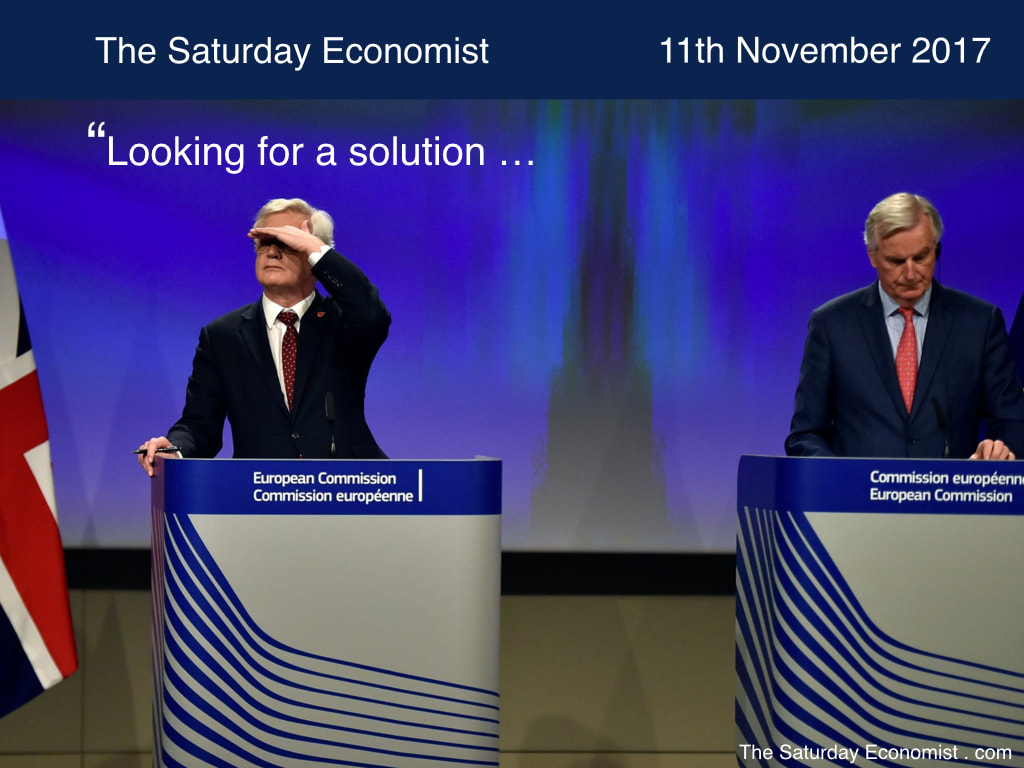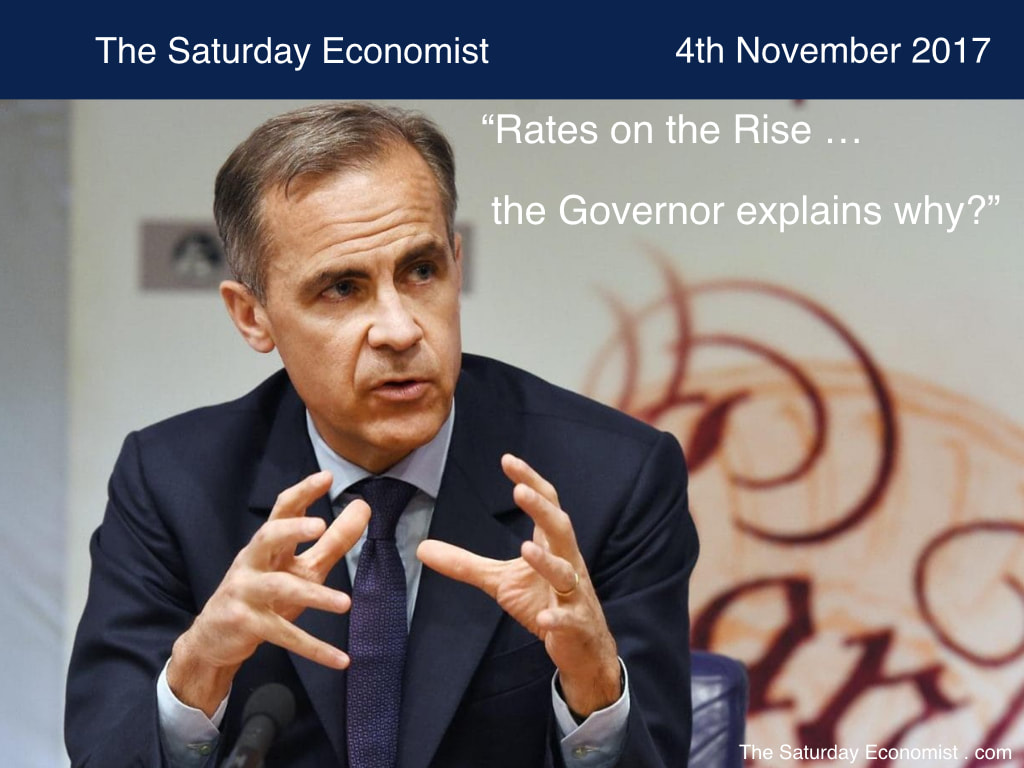|
It was a good budget. A budget for jobs and housing. Primarily it was about Hammond's job as Chancellor and housing in Downing Street. But let's not be too cynical. It was an appeal to the youth vote and the Tory back benches. Abolition of stamp duty for first time buyers and the extension of the rail card discount to first time voters of the Labor Party. How the young will swing to the rhythm of the Red Box. Or so it is hoped.
The Tory back benches are more easily bought off. The provision of £3 billion to prepare for Brexit, was enough to convince the EU sceptics that Hammond is truly "One of Us". Yes Brexit means Brexit and the Treasury provision is proof of commitment. No mention in the budget of the £50 billion provision required just to move to the next stage on trade negotiations. [Just ten days left, the Prime Minister was warned this week.] No mention either of the £18 billion commitment to the Health Service, outlined on the side of the Brexit bus. The NHS will have to make do with £2.8 billion to be spent on bringing down waiting times for A&E and routine surgery, especially in marginal constituencies. It was all too much for Simon Stevens, head of NHS England. The NHS has called for a minimum £4 billion each year to avoid cuts to cancer care and mental health. "Don't fight Treasury now" the NHS boss has been told. No time to ask for more money! "Join the waiting list like everyone else" he was advised ... just wait on a trolley in the corridors of power. Strange how now, we measure budget success. No gaffes, no arithmetic errors, no policy recantation within days of release. The Chancellor was relaxed and in control at the Despatch Box. Time for jokes with props delivered by the Prime Minister. Cough sweets on hand, jibes at the opposition. It was a good performance. Sound without fury, signifying little. The overall fiscal impact was broadly neutral. The £40 billion for housing turned out to be just £1.5 billion of new money measures. The abolition of stamp duty would merely push up prices as Robert Chote, chair of the OBR explained the following morning. The OBR had set the tone with a dismal outlook for growth in the years ahead. Why do we pay so much attention to the "Forecasts"? They represent a "Scenario Outlook" with little credibility beyond the immediate forecast horizon. The Treasury wants gloom as the guideline for the Brexit zealots. Yes and it could get worse, the downside of a no trade deal. Why the obsession with "productivity"? It neatly draws attention away from the failures of government in transport, infrastructure, telecommunications, education, skills, training, apprenticeships and so much more ... The focus turns away from government to the slothful indolence of the British workers. Too much gin in the 1880s, too many tea breaks in the 1960s, too many strikes in the 1970s. Did you know, a German can do more in four days than a Brit can do in five". That's why the close the Bierkellers on a Thursday night. Job done in the Deutsche service sector. What nonsense this all is. But what of business? If it isn't the worker it is the failure of industry to invest. Newsnight appears to think we are still using fax machines and typewriters. Well at least the Russians can't hack carbon paper. Back to searching the dustbins, now that would be a real hit to the productivity of labour. Productivity is not some magic fairy dust. It is an arithmetic outcome of output divided by labour. Complaints about the lack of productivity date back to the waning of the Spinning Jenny, as the driving force in the workshop of the world. The move to a service sector economy will move to unitary growth in productivity. Comparisons on investment trends fail to capture the hedonic cost reductions in hi tech equipment. It is not the fault of the workforce or business. It is time to confront the problem of a chronic lack of investment in TiT. Transport, Infrastructure and Telecommunications. Don't blame business ... but ... Economics news this week ... save the puppies ... "Business is making my job harder" explains Liam Fox. "Fat, lazy and playing too much golf", now the trade secretary claims businesses just do not want to export. "I can agree as many trade agreements as I like, but if British business doesn’t want to export, then that doesn't do us any good," Fox told House Magazine this week. You do have to wonder about the suitability of the man for the rôle. "First let them do no harm" is the mantra for Chancellors and should be for the President of the Board of Trade. What are the deals being done and for whom, is the real question. Once again it is not the fault of government. The failure is with business, failing to invest, failing to export, failing to meet the £1 trillion pound export target. For the moment, no point Fox hunting for deals that can't be delivered. No deals can be done until we leave the EU at 11:00pm on the 29th March 2019. Michael Gove is hot to trot. Tipped to be the next incumbent of Number eleven. it is not to happen. He bounced back in the face of Hammond's budget "success". Gove had been practicising his "economicky" words. All to no avail. Gove focused on the good news from leaving the EU ... Brexit will help save puppies. Yes animals and minsters are sentient beings, despite obvious evidence to the contrary. Michael Gove has promised to take action over puppy smuggling once Britain leaves the EU. Did you know, EU rules restrict us from cracking down on puppy smuggling? Shocking. Gove is now the champion of the young pups. Puppies are for life not just for Christmas. Just like Red Box promises on budget day ..
1 Comment
Whispering sweet nothings ... Donald Tusk asks for more ...
Last week Michel Barnier set the deadline. This week Donald Tusk made it clear. The European Council president has set a deadline of the start of December for Britain to make further movement on the Brexit divorce bill. So far Theresa May has just been whispering sweet nothings. It is time to "up the ante" or "faire monter les enjeux", as they say in Brussels, if progress is to be made in December. Mr Tusk explained, the EU has completed the internal work necessary to give the green light for talks on trade and transition to begin at the next European Council summit in Brussels. But “much more progress” is needed from the UK, on two of the three key issues, in order to break the deadlock. “We will be ready to move on to the second phase in December, but in order to do that, we need to see more progress from the UK side,” said Mr Tusk. Not least the money. More money on the table is required. There can be no talks about trade, until bills have been paid. This has long been clear. David Davis, appears to think, progress and concessions are being made. Tusk took aim at the Brexit secretary. Asked about his claim that Britain had made all the concessions so far in the negotiations, Mr Tusk said: “I can say, only that I appreciate Mr Davis’s English sense of humor.” Ah yes "Sinn für humor" as they say in Frankfurt, "was ist das" they invariably add. The Irish prime minister, Leo Vradkar, warned this week, he could veto Brexit talks over the prospect of a hard border with Ireland. Mr Varadkar, had breakfast with Mrs May at Friday’s summit. He told Sky News: “Before we move to phase two talks on trade, we want taken off the table any suggestion that there will be a physical border or new barriers to trade on the island of Ireland." "After 40 years of marriage, most of them good, now Britain wants a divorce but an open relationship the day after." “Sometimes it doesn’t seem like they have thought all this through.” Well who would think that! Does anyone really know what we would like the open relationship to be? We will have to wait until 11:00pm one day in 2019 to find out. Lloyd Blankfein, boss of Goldman Sachs demonstrated he has a sense of (English) humor. "With so much at stake, and CEOs fretting about the outcome, why not make sure the consensus is still there", he tweeted. Blankfein doesn't tweet much. But yes this is a call for a second referendum. Whispering sweet nothings? Perhaps, but you know it makes sense … Economics news this week ... Inflation and jobs ... Just days to go to the budget. Spreadsheet Phil will reveal the contents of his Red Box on Wednesday. Many believe this will be his last budget. To satisfy the Brexiteers, the Chancellor should ride to the House of Commons in a tumbril, eschewing the Treasury black limo for a much lower estate. Ah yes the tumbril, an open cart tilting backwards to empty out its load. The tumbril was used to convey condemned prisoners to the guillotine during the French Revolution. Such is the current fate of those who do not speak with committed ardour to the cause of decapitating the UK export drive. Johnson and Gove will be knitting and plotting on the front benches on Wednesday. Alas poor Hammond we knew him well. The latest data on inflation, jobs and retail sales were released this week. Inflation CPI basis was unchanged at 3.0% in October. It must have been a close call. Service sector inflation was steady at 2.7%. Goods inflation edged up to 3.3%. RPI inflation increased to 4.0%. Prices are rising but producer price pressures are easing, suggesting the worst may be over in the short term. Just in time for the Bank of England to take the credit. Output prices increased by 2.8%. Input costs increased by just 4.0%, they were up by 20% at the start of the year. The impact of the fall in Sterling and the rise in oil prices, is working its way out of the annualised data. Good new on jobs. The number of people unemployed fell by a further 20,000 in the three months to September to 1.425 million and a rate of 4.3%. The number of vacancies eased back slightly but the data is subject to revision. We don't worry too much about one months information. Good news also on earnings. Earnings increased in September to 2.6% from 2.4% prior month. Household incomes remain under pressure as real earnings fell despite the wage rise. Retail Sales in October fell by -0.3% compared to the same period last year. Spending increased by 2.8% compared to the heady 5% prior quarter. Are consumers "coppering" up for Christmas or Black Friday for that matter? We shall have to wait and see. The figures are concerning but out of context with the jobs and vacancy data for the moment … © 2017 John Ashcroft, Economics, Strategy and Social Media, experience worth sharing. ______________________________________________________________________________________________________________ The material is based upon information which we consider to be reliable but we do not represent that it is accurate or complete and it should not be relied upon as such. We accept no liability for errors, or omissions of opinion or fact. In particular, no reliance should be placed on the comments on trends in financial markets. The receipt of this email should not be construed as the giving of advice relating to finance or investment. ______________________________________________________________________________________________________________ If you do not wish to receive any further Saturday Economist updates, please unsubscribe using the buttons below or drop me an email at [email protected]. If you enjoy the content, why not forward to a friend, they can sign up here ... _______________________________________________________________________________________ For details of our Privacy Policy and our Terms and Conditions check out our main web site. John Ashcroft and Company.com _______________________________________________________________________________________________________________ Copyright © 2017 The Saturday Economist, All rights reserved. You are receiving this email as a member of the Saturday Economist Mailing List or the Dimensions of Strategy List. You may have joined the list from Linkedin, Facebook Google+ or one of the related web sites. Our mailing address is: The Saturday Economist, Tower 12, Spinningfields, Manchester, M3 3BZ, United Kingdom. Michel Barnier has set the deadline. The British government has two weeks to give "vital" clarification on the financial commitments it is prepared to make. There can be no talks on trade before bills have been paid.
The Prime Minister has set the deadline. Britain will leave the EU on the 29th March 2019. There can be no obfuscation. We are leaving at 23:00 hours on the last Friday in the month. Just a few details to be sorted out along the way. Well, quite a few actually. For now, the money is important. The settlement figure acceptable in Brussels, will be unpalatable on the back benches. David Davis may have a figure in mind. For the moment Davis is loathe to release the "quantum of solace" for the EU. Any amount over £350 million per week will cause turmoil in the Tory ranks. Any amount offered may well be rejected by the Barnier band in any case. Then of course, the Irish question is of problematic importance. Hard or soft border? Assuming the UK stays inside the free market and the customs union, the border issue will melt away. Theresa May has made it clear, we are leaving the EU, the single market and the customs union. What then is the solution for Ireland? Unification or the creation of a "Free State" akin to Hong Kong or Macau? An interesting debate to follow within the DUP and the thin Conservative majority. For the moment the question of EU citizenship subject to ECJ regulation has moved to the sidelines. David Davis is looking to a wider audience for solutions. Meanwhile, John Lewis has launched the Christmas ad featuring Moz the monster. No one appears to have realised this is outrageous campaign propaganda to stay within the European Market. Moz the Monster is clearly the threat of leaving Europe, troubling the child like David Davis, with difficulty sleeping at night. Finally the solution appears in the form of a night light. The darkness of departure can be switched on or off. This week, Lord Kerr delivered the night light. There is nothing inevitable about the Article 50 process, Lord Kerr explains. We can simply change our minds, turn the night light on and stay within the enlightened zone of Europe .... Yep and you thought it was just a TV ad about the "holiday season" ... Economics news this week ... Trade and Output ... Looking for a solution? The ONS released the latest data on trade and output this week. Manufacturing output increased by 2.7% in September and by 2.7% in the quarter as a whole. The figures are in line with the preliminary estimate of GDP for the quarter. So no real excitement there. Output remains some 3% below the peak registered in February 2008. It has been a long slow recovery, still to achieve prior peaks of performance. World trade increased by over 5% in the quarter. Strong performance in China with recovery in the USA and Europe is assisting growth. The UK will benefit from world trade expansion. The uncertainty about Brexit and investment will inhibit growth generally. The problems in the motor trade will inhibit growth specifically. We expect manufacturing output to increase by just over 2% for the year as a whole. The trade figures for September were also released this week. In the three months to September 2017, the total UK trade (goods and services) deficit widened by £3.0 billion to £9.5 billion. The deficit (trade in goods) was £35.7 billion in the quarter, offset by a service sector surplus of £26.3 billion. The figures were slightly better than expected. For the year as a whole we would now expect a deficit (goods) of £137 billion offset by a £103 billion surplus on services. And what of the external deficit? In 2016, the current account deficit was almost 7% off GDP. A record for UK data. In 2017, the current account deficit will narrow to around 4.5% of GDP. An improvement of course but a level incompatible with base rates at just 0.5% ... © 2017 John Ashcroft, Economics, Strategy and Social Media, experience worth sharing. ______________________________________________________________________________________________________________ The material is based upon information which we consider to be reliable but we do not represent that it is accurate or complete and it should not be relied upon as such. We accept no liability for errors, or omissions of opinion or fact. In particular, no reliance should be placed on the comments on trends in financial markets. The receipt of this email should not be construed as the giving of advice relating to finance or investment. ______________________________________________________________________________________________________________ If you do not wish to receive any further Saturday Economist updates, please unsubscribe using the buttons below or drop me an email at [email protected]. If you enjoy the content, why not forward to a friend, they can sign up here ... _______________________________________________________________________________________ For details of our Privacy Policy and our Terms and Conditions check out our main web site. John Ashcroft and Company.com _______________________________________________________________________________________________________________ Copyright © 2017 The Saturday Economist, All rights reserved. You are receiving this email as a member of the Saturday Economist Mailing List or the Dimensions of Strategy List. You may have joined the list from Linkedin, Facebook Google+ or one of the related web sites. Our mailing address is: The Saturday Economist, Tower 12, Spinningfields, Manchester, M3 3BZ, United Kingdom. The Bank of England increased base rate this week. It was the first rate hike in a decade. More of a nudge than a hike, the decision to increase base rate to 0.5% merely returned interest rates to the "status quo ante referendum". The move to cut rates in August last year was considered by many to be a mistake. The move compounded the weakness of Sterling, increasing the pressures on inflation into 2017. So why has the bank acted now? Growth has softened into the third quarter, concerns about Brexit persist. The Bank of England is seriously concerned about jobs, incomes and investment as a result of the Brexit decision. "In many respects the decision was straightforward" explained the Governor, "With inflation high and slack disappearing, the economy is growing at rates above it's speed limit. Inflation is unlikely to return to the 2% rate without some increase in interest rates." Mmmm Was it really so straightforward? Not all MPC members were convinced. Sir Jon Cunliffe, Deputy Governor for Financial Stability and Dave Ramsden, Deputy Governor for Markets voted against the rate rise. Two out of three deputies were doves. Just one was a hawk. Ben Broadbent, Deputy Governor for Monetary Policy voted for the rate rise. Later he warned that the interest rate increases would mean pain for households. How things have changed. Ben was still at Cambridge when a rate rise of 25 basis points would appear as a Threadneedle Street typo. In the late 80's Rates increased from 9% to 16% in a two year period. At that time, the Bank of England did not consider interest rates had any impact on consumer spending at all. Keynes' would have us believe that interest rates impact only on the investment cycle. So much for home ownership and mortgage finance! Never a feature of the Keynes' data bank. So why hike now? The MPC primary responsibility is price stability defined as a 2% CPI inflation target. Inflation was 3% in September. It is expected to have risen a little further in October according to the Governor. Further rate rises will occur at a gradual pace and to a limited extent. Forward guidance returns. Market expectations are for two further 25 basis points increases over the next three years. Sterling slipped as the Bank announced the decision. Markets rallied as improved dollar earnings will feed into profits. The Bank has made the move to follow the Fed. So what is the path of future interest rates? The answer may well lie in the Pink Book, published last week without too much coverage … The Balance of Payment Pink Book was published last week. The data for 2016 confirmed a widening of the current account deficit to 5.9% of GDP. The deficit widened to the largest since records began in 1946. The trade deficit in goods was £135 billion, offset by a £93 billion surplus on services. In the current year we expect comparable figures to be £140 billion and £100 billion. The overall trade in goods and services deficit is 2.2% of GDP. Of itself a slight concern but fundable given the kindness of strangers and a soft spot for soft yields. The problem in 2016 was the deterioration in the net investment position. The primary income deficit increased to 2.6% of GDP. UK earnings on assets abroad have fallen relative to earnings on foreign investment in the UK. This is the first time the deficit has appeared since records began in 1997. The UK stock of international investments was negative by just over £20 billion. The depreciation of Sterling flattered the overall position. We have seen large deficits on current account before but not to this extent. In 1989 the deficit neared 5% of GDP. Base rates were hiked to 15% to inhibit domestic demand and prevent a run on Sterling. In 1974, the deficit hit 4% of GDP. Rates were hiked to 14%. The Treasury was forced to turn to the IMF for help. The Governor believes that two modest rate rises over the next three years will do the job this time round. "The kindness of strangers, with inky blots and rotten bonds sustained" may yet be exhausted if the Brexit outcome appears too harsh for future earnings and yields. Concerns will fail to be alleviated by a further fifty basis points rise in rates. If external pressures materialize, we will see the real pain for households to which Ben Broadbent alludes … © 2017 John Ashcroft, Economics, Strategy and Social Media, experience worth sharing. ______________________________________________________________________________________________________________ The material is based upon information which we consider to be reliable but we do not represent that it is accurate or complete and it should not be relied upon as such. We accept no liability for errors, or omissions of opinion or fact. In particular, no reliance should be placed on the comments on trends in financial markets. The receipt of this email should not be construed as the giving of advice relating to finance or investment. |
The Saturday EconomistAuthorJohn Ashcroft publishes the Saturday Economist. Join the mailing list for updates on the UK and World Economy. Archives
July 2024
Categories
All
|
| The Saturday Economist |
The material is based upon information which we consider to be reliable but we do not represent that it is accurate or complete and it should not be relied upon as such. We accept no liability for errors, or omissions of opinion or fact. In particular, no reliance should be placed on the comments on trends in financial markets. The presentation should not be construed as the giving of investment advice.
|
The Saturday Economist, weekly updates on the UK economy.
Sign Up Now! Stay Up To Date! | Privacy Policy | Terms and Conditions | |




 RSS Feed
RSS Feed